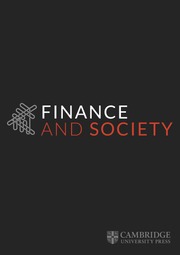Article contents
The logic of leverage: Reflections on post-foundational political economy
Published online by Cambridge University Press: 09 November 2023
Extract
This rejoinder takes up some of the points that have been raised by the reviews of Capital and Time in this forum. It engages the question of how political economy should position itself vis-à-vis concerns about the dangers of essentialism and teleological explanation. It argues that a proper theorization of the logic of ‘leverage’ is key to the development of a political economy that appropriates the insights of post-foundational theory but is still able to account for the reality of power and inequality.
- Type
- Forum: Capital and time
- Information
- Creative Commons
- This is an Open Access article, distributed under the terms of the Creative Commons Attribution-NonCommercial-No Derivatives licence (http://creativecommons.org/licenses/by-nc-nd/4.0/), which permits noncommercial re-use, distribution, and reproduction in any medium, provided the original work is unaltered and is properly cited. The written permission of Cambridge University Press must be obtained for commercial re-use or in order to create a derivative work.
- Copyright
- © 2018 The Author(s)
References
- 3
- Cited by




